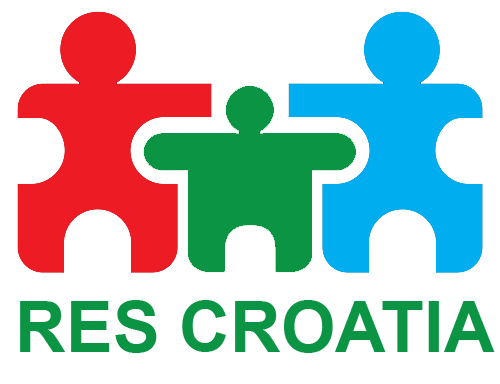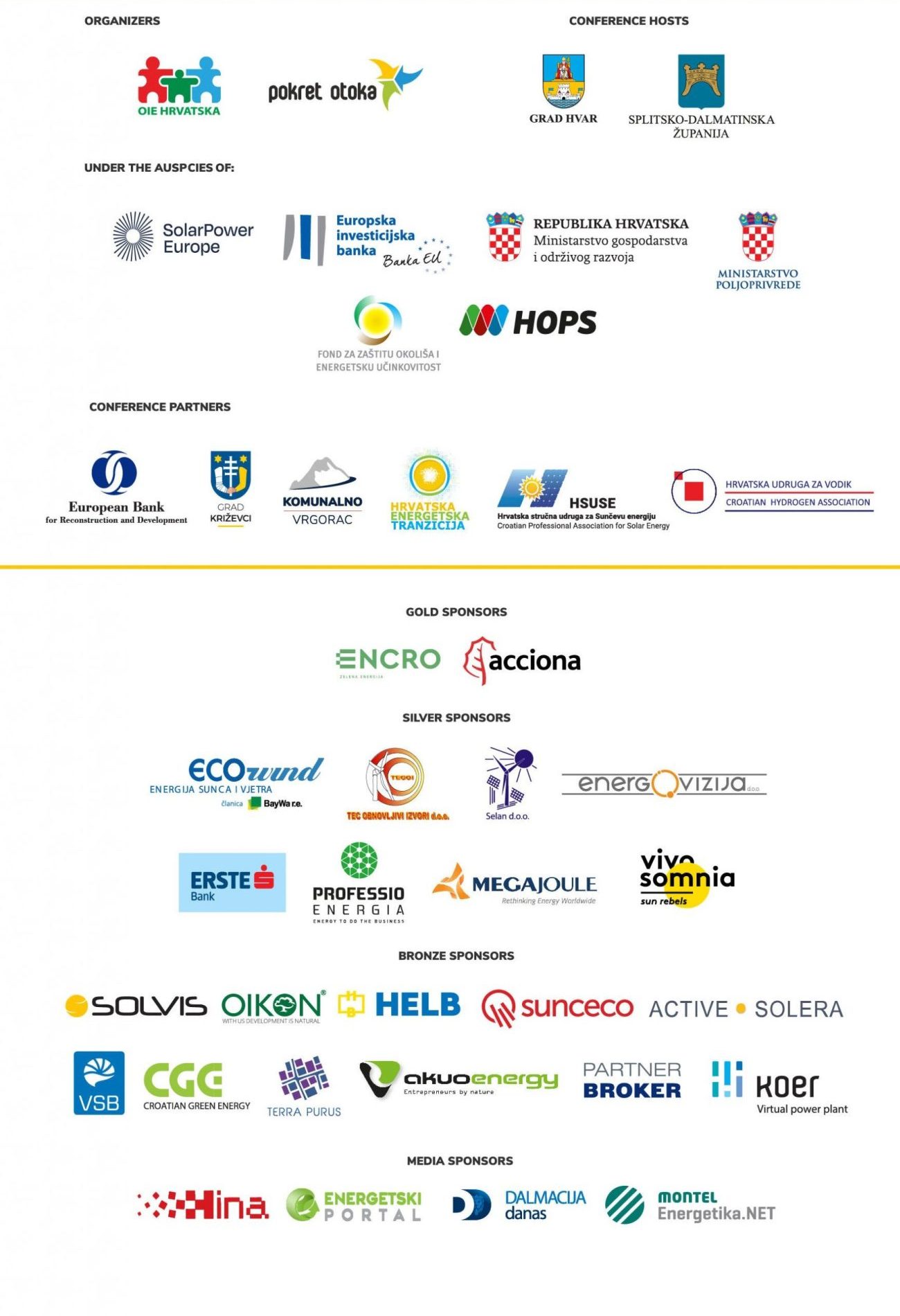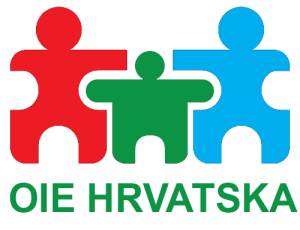Organizer
Renewable Energy Sources Croatia
Island Movement
SUNNY DAYS
30 September - 1 October 2021
Hvar Town
- Arsenal & hotel Amfora -
The natural potential of solar energy in Croatia is large and usable in all its parts, and this conference is intended for everyone whose activity and interest is directed towards the energy development that will follow such potential!
ACCOMMODATION
You can book accommodation at www.suncanihvar.com where by entering the code DS2021 you get a 30% discount on regular prices in the Amfora and Pharos hotels
Program
| Day 1 30 September 2021 Arsenal Conference Room | |
| Moderator: Blaženka Leib | |
| 18:00 | Welcome speeches: |
| Stipe Čogelja, Deputy Prefect, Split-Dalmatia County | |
| Rikardo Novak, Mayor, City of Hvar | |
| Maja Pokrovac, Managing Director, Renewable Energy Sources of Croatia | |
| Maja Jurišić, Project Manager, Island Movement | |
| 18:30 – 18:40 | Video conference call: |
| Walburga Hemetsberger, CEO of SolarPower Europe | |
| 18:40 – 18:55 | Presentation: Applications of Solar |
| prof. dr. sc. Neven Duić, Faculty of Mechanical Engineering and Naval Architecture | |
| 18:55 – 19:55 | PANEL 1: European and National Strategy for Green Transition |
| Moderator: Maja Pokrovac, RES Croatia | |
| Ivo Milatić, State Secretary, Energy, Ministry of Economy and Sustainable Development | |
| Lana Bačura, Directorate for Agricultural and Rural Development Grants, Ministry of Agriculture | |
| Stipe Čogelja, Deputy Prefect, Split-Dalmatia County | |
| 20:00 | Reception, terrace of Hotel Riva (BB Club) |
| Day 2 1 October 2021 Amfora hotel | |
| 9:00 – 9:30 | Introductory presentation: New Regulatory Framework for Green Transition |
| Ivo Milatić, State Secretary, Energy, Ministry of Economy and Sustainable Development | |
| 09:30 – 10:45 |
PANEL 2: Status and Future of Photovoltaic Power Plants in Croatia |
| Moderator: Aljoša Pleić, Acciona | |
| Ivo Milatić, State Secretary, Energy, Ministry of Economy and Sustainable Development | |
| Zdravko Tušek, State Secretary, Agriculture, Ministry of Agriculture | |
| Ozren Fućak, Project Manager – Specialist, HROTE | |
| Dr.sc. Tomislav Plavšić, President of the Management Board, HOPS | |
| 10:45 – 11:00 |
Coffee break |
| 11:00 – 11:15 | Presentation: Solar Potentials in Croatia |
| Ninoslav Holjevac, Faculty of Electrical Engineering and Computing | |
| 11:15 – 12:30 |
PANEL 3: Solar Technologies in Croatia |
| Moderator: Ines Ban-Kolić, Elvirtus | |
| Stjepan Talan, CEO, Solvis | |
| Ljubomir Majdandžić, Croatian Professional Association for Solar Energy | |
| Zdravko Krmek, CEO, Sunceco | |
| Frano Barbir, President, Croatian Hydrogen Association | |
| Ivana Chaux-Jukić, Member of the Management Board, Active Solera | |
| Edo Jerkić, CEO of Vivo Somnia, Member of the Management Board of Megajoule | |
| 12:30 – 14:00 |
Lunch |
| 14:00 – 15:15 |
PANEL 4: Application of Solar in Economy, Industry and Entrepreneurship |
| Moderator: Tomislav Ćurković, Encro | |
| Stephan Schindele, Head od Product Management Agri-PV, BayWa r.e. | |
| Mirko Ervačić, CEO, Osatina Group | |
| Ugo Toić, CEO, Island Development Agency OTRA | |
| Ivan Šimić, Technical Director, EnergoVizija | |
| Marko Lasić, CEO, KOER | |
| Zoran Miliša, Independent Energy Expert | |
| 15:15 – 16:30 |
PANEL 5: The Role of Citizens and Local Government in Green Transition |
| Moderator: Maja Jurišić, Island Movement | |
| Mario Rajn, Mayor, City of Križevci | |
| Miljenko Polić, CEO, Utility Company, Vrgorac | |
| Ivan Zoković Cola, Head of the Energy Cooperative Novi Otok, Korčula | |
| Šime Fio, Member of the City Council, City of Hvar | |
| Saša Jovičić, NESOI European Islands Facility | |
| Maja Rajčić, Head of Energy Efficiency Sector, Environmental Protection and Energy Efficiency Fund | |
| 16:30 – 17:45 |
PANEL 6: Economic and Financial Sustainability of Projects |
| Moderator: Mladen Sirovica | |
| Victoria Zinchuk, CEO, European Bank for Reconstruction and Development (EBRD) | |
| Luka Bayer, Head of Structured Finance Division Large Corporates, Erste Bank | |
| Stevo Rajevski, CEO, South Eastern Europe Renewable Energy Fund | |
| Mario Klarić, CEO, Professio Energia | |
| Stipe Čogelja, Deputy Prefect, Split-Dalmatia County | |
| Anton Kovačev, Head of the EIB Group Office in Zagreb | |
| 17:45 – 18:00 |
Closing remarks |
Panels
| European and national strategy for green transition | The European Green Plan focuses on sustainable growth, which includes the transition to a just society with a modern, resource-sustainable and competitive economy with net zero CO2 emissions in 2050. Implementing the Green Plan at national level is a major challenge for all EU members, including Croatia. The green transition in Croatia will be achieved by switching to clean energy, encouraging green investments, strengthening self-sufficiency in food production and developing a sustainable and circular bioeconomy. We have potentials, goals have been set, funds are available to us, but are ambitions enough? How ready are we to turn climate and environmental ambitions into real projects? What reforms are ahead of us and what do the new legislative frameworks bring? Where are our opportunities, potential pitfalls, and where are our biggest challenges? |
| Status and future of photovoltaic power plants in Croatia | Europe is on track to become the world’s first climate-neutral continent, and solar energy can help achieve that goal. According to all predictions, brighter days await solar energy. Falling costs and new energy policies are the main reasons for optimistic forecasts of a large growth in the number and installed capacity of solar power plants by the end of this decade. Croatia started with the development of photovoltaic power plants about 10 years ago and there is still a great untapped potential that attracts great interest. Can we realize all the expected projects in accordance with the spatial and environmental conditions? Where are the other developmental, procedural and administrative ailments, and how to solve them? At what pace can we increase the use of solar energy? |
| Solar technologies in Croatia | The way solar energy is used has long gained wider public attention, and the development of technologies based on the use of solar energy and their commercial use is constantly increasing. Today, modern solar technologies are expected to be innovative, reliable, environmentally friendly, and compatible with smart grids. Without such solutions, there is no successful energy transition. Therefore, it is necessary to encourage innovation and research and systematically invest in education. Where is Croatia compared to the rest of the world when it comes to new solar technologies? What is being done and what solutions do domestic producers develop? Is there enough quality and systematic cooperation between the economy and the academic community? |
| Application of solar in economy, industry and entrepreneurship | In addition to using solar energy for household needs, such as space heating, water or electricity production, the possibility of its use in the automotive industry, agriculture, construction sector, mining, hydrogen production, etc. is increasingly recognized. Solar energy is in synergy with many sectors and can meet many energy requirements. Where is this synergy most pronounced in the Croatian economy? Can solar energy bring greater competitiveness to the economy, reduce costs and create new added value? How to use all Croatian solar potential wisely and innovatively? |
| Economic and financial sustainability of projects | Legal certainty, simplified administrative processes and sustainable financial construction are some of the key elements that guarantee success in the implementation of RES projects. Although investors in the production of energy from renewable sources are much more bothered by the administration, the financial construction is a very important element in the implementation of projects. Financial institutions are tightening rules, seeking greater guarantees, adapting to ‘green’ trends and increasingly supporting environmentally friendly and sustainable projects in all areas of RES. What projects will banks and funds in Croatia invest in and what are their criteria? What is needed for greater engagement of capital and security of its return? How to ensure the sustainability of projects? |
| The role of citizens and local self-government in the green transition | Local governments play a significant role in the transition to fully renewable energy and their support is very important. Local authorities apply national rules at the local level, so their active participation in the creation of transition policies and local strategies is extremely important. It is necessary to educate citizens and encourage them to individual and joint investments in RES projects. They also need to be able to use RES easily and affordably in order to develop distributed energy production more strongly. How to strengthen the role of local communities in the implementation of projects in their area? What is the current cooperation between investors and local communities? How to take advantage of the growing interest of citizens in participating in the green transition? |






